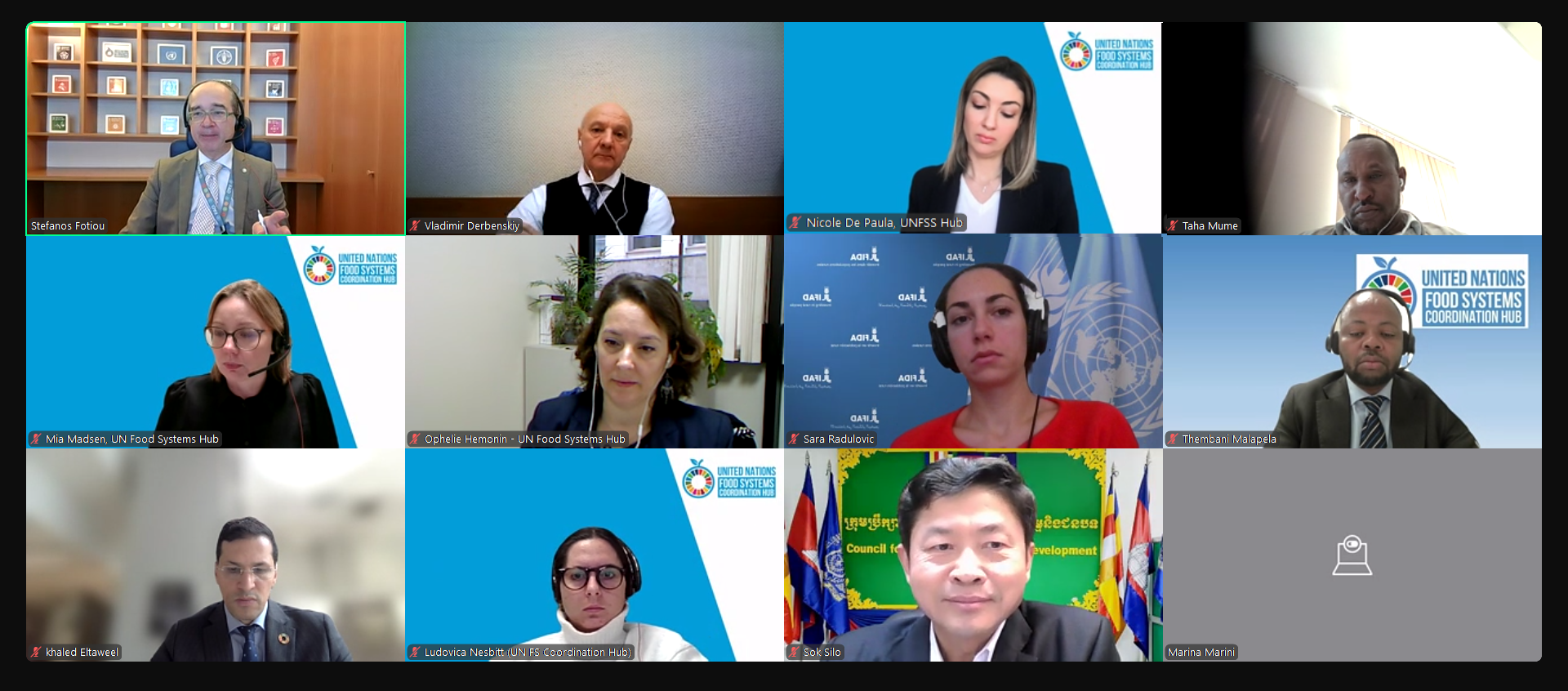SEED FUNDING JOINT PROGRAMMES
Cambodia
Transforming Cambodia’s food systems to become more sustainable, inclusive, and resilient


PROJECT TITLE | Transforming Cambodia’s food systems to become more sustainable, inclusive, and resilient |
| Context | Cambodia’s National Pathway is the outcome of an extensive consultation process, involving more than 2,000 people throughout thirty dialogues, which identifies four priority areas, namely healthy diets for all, empowerment of youth, women and vulnerable groups, resilient livelihoods and food systems, inclusive governance. Acknowledging the risks posed by climate change to hard won development gains and as a co-founder of the Alliance of Champions for Food Systems Transformation, Cambodia is prioritizing the integration of climate change and food systems transformation, building coherence across the agendas. The Council for Agricultural and Rural Development, the government agency coordinating food security and nutrition initiatives in Cambodia, is leading collaborative efforts to translate national aspirations into concrete action. |
| PUNOs | FAO, WFP, UNICEF |
| Contribution to SDGs | SDG 2 Zero Hunger |
| Contribution to other SDG transitions | Climate, biodiversity, pollution |
| Duration | August 2024 – July 2025 |
| Expected financial leverage | $3 million |
| Alignment with SG Call to Action | Policy integration; Food systems governance; Inclusive and participatory design; Private sector engagement |
| Outcomes | The Joint Programme fosters an enabling environment for food systems transformation by enhancing national capacities and policy frameworks, identifying opportunities to unlock financial streams, and strengthening advocacy efforts for food systems transformation. The JP provides crucial support to the alignment of the climate and food agendas, accelerating progress towards resilient, sustainable and inclusive food systems. |
| Partners | Council for Agricultural and Rural Development (CARD) will be the main government counterpart and will coordinate the government activities in conjunction with other key Ministries, including:
|
| Outputs |
|
Global Touchpoint with National Convenors

The UN Food Systems Coordination Hub convened a Global Touchpoint with National Convenors on 11 December 2024, providing a platform to review the work accomplished in 2024, share progress on Hub flagship initiatives, and set the stage for the 2nd UN Food Systems Summit Stocktaking Moment (UNFSS+4) in 2025.
Flagship initiatives in focus
The Hub provided updates on progress across its flagship initiatives:
- The Convergence Initiative: Bridging food systems transformation with climate action, this initiative addresses shared challenges like food insecurity and climate shocks. Following COP29, it will scale to 20 countries by COP30 to broaden its impact.
- Financial Flows to Food Systems (3FS): Co-developed by IFAD and the World Bank in collaboration with the Hub, the 3FS tool tracks and aligns food systems financing from public, private, and international sources. Pilots in Niger, Peru, and Kenya will inform scaling to 11 additional countries, enhancing financing insights.
- UN Joint SDG Fund - Food Systems Window: Supporting national pathways, this fund offers targeted seed and high-impact funding to advance innovative solutions. Upcoming rounds will focus on scaling proven projects, with an emphasis on climate resilience and biodiversity.
- Youth Leadership Programme (YLP): Engaging 80 young leaders from 65 countries, the programme builds a diverse cohort equipped to drive systemic change. It also works to strengthen collaboration through the Science-Policy-Society Interface (SPSI), where youth are involved in co-creating national action plans in six pilot countries.
- Operationalizing national food systems pathways: The Hub continues to support governments to integrate food systems approaches into national and subnational policies. This includes building inclusive governance structures, investment plans, and cross-sectoral partnerships, alongside upcoming tools like a tracking dashboard to monitor progress and a virtual library of practical resources for implementation.
Insights and priorities from National Convenors
Interactive discussions with National Convenors emphasized the importance of aligning efforts with global priorities while addressing national challenges. Convenors highlighted the need for regional platforms in 2025 to showcase progress, exchange solutions, and foster collaboration. Expectations for UNFSS+4 include a focus on tangible impacts, actionable outcomes, and critical themes such as financing, governance, and inclusive partnerships. Convenors also underscored the value of engaging youth, civil society, and private sector actors to build resilient, sustainable food systems.
Looking ahead to 2025
The Hub reaffirmed its commitment to supporting countries through regional forums, enhanced collaboration, and knowledge-sharing platforms. Preparations for UNFSS+4 are already underway, with a focus on showcasing national progress, fostering innovation, and maintaining global momentum.
